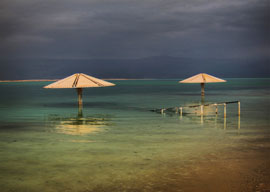
January 06, 2017

Dead Sea
Source: BIgstock
In 1922 Churchill told the House of Commons that “The whole map of Europe has been changed””by the Great War. “But,” he said, “as the deluge subsides and the waters fall short we see the dreary steeples of Fermanagh and Tyrone emerging once again. The integrity of their quarrel is one of the few institutions that has been unaltered in the cataclysm which has swept the world.” Well, today, there has been an answer”of sorts, anyway”to the Irish Question, but Churchill’s words might equally be applied to the Israel-Palestine Question. The integrity of that quarrel persists. It began before the 1948 War, which followed the end of the British Mandate, and it goes bleakly on and on. It has outlasted almost everyone engaged in the creation of the state of Israel, and endured the whole length of Benjamin Netanyahu’s life. There is no resolution in sight.
Last week the outgoing secretary of state, John Kerry, made a sad valedictory speech; sad because he admitted his failure to advance the peace process, valedictory in that he could not conceal his bitterness and spoke of the present Israeli government in harsh terms that, not surprisingly, have been resented. He did quite rightly speak of terrorist attacks on Israel, but the unspoken implication was that this is to be expected if you are an occupying power. When the Nazis condemned Resistance attacks on the Wehrmacht, General de Gaulle remarked that if they didn”t want Frenchmen to shoot German soldiers they should get out of France.
Mr. Kerry has tried, vainly, to advance the two-state solution, but recognizes that it is as far away as ever, and is indeed close to being dead in the water. The more Israeli settlements are established in the occupied territory of the West Bank, the less likely the chance of a viable Palestinian state ever coming into being. This is obvious, and whatever Mr. Netanyahu’s own view may be, he is boxed in by his coalition colleagues, who are committed to Jewish occupation of the Biblical Land of Israel.
This is where Mr. Kerry made what seems to me an undeniable point. Such a state, he said”the one-state solution”can be Jewish or democratic; it cannot be both. Israel today is, of course, both. It is a Jewish state”or a Jewish-dominated one”and it is a functioning and vibrant democracy, the only one in the Middle East. It has a population of around 8.3 million, 75% Jewish. In Israel the 1.7 million Arabs (mostly Muslim, though with a large Christian minority) enjoy political and civil rights; there are Arab parties in the Knesset, Arab schools and newspapers, mosques, etc.
But what happens if the creeping colonization of the West Bank continues under the protection of the Israeli military and security forces? What happens if this leads, as it seems to some to be leading, to formal annexation? Inevitably the balance shifts. There are approximately 6.8 million Palestinians in the West Bank and Gaza, the great majority of them Arab and Muslim. There would no longer be a Jewish majority in the single state, or, at best, a slim one if Gaza were excluded. Greater Israel could remain a Jewish state only if the Palestinian Arabs were denied political rights. Should they be so denied, then Greater Israel wouldn”t be a democracy as we understand the term in the West: a state all of whose adult inhabitants have the vote and are able to participate in politics.
Israel has often been compared to apartheid South Africa. The comparison is just only inasmuch as Israeli Jews and white South Africans (especially the dominant Afrikaners) have seen, or saw, themselves as embattled. But it has been unjust because while the black majority in South Africa were denied the vote and excluded from all but local and tribal politics, the Arab minority in Israel have not been excluded from public life. There has in reality been nothing comparable to apartheid in Israel. A cynic might say it hasn”t been necessary. Israel’s enemies are beyond Israel’s borders; for the Nationalist government of apartheid South Africa the black population was the enemy within. Nevertheless South Africa was able to practice a form of democracy, but one with a gaping hole in the middle, for democratic participation was almost entirely limited to the white population (both Afrikaner and English-speaking).